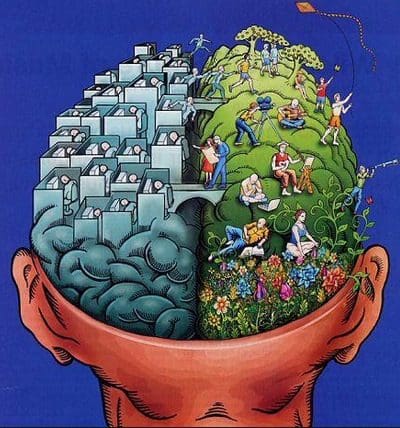What Should Data Scientists Know About Psychology?
Due to training in the scientific method, data management, statistics/data analysis, subject matter expertise, and communicating results into substantive knowledge psychology researchers must have a solid understanding of data science and vice-versa.
By Arielle Morganstern, U. of Oregon.

The field of “data science” requires several meaningful categories of skillsets and as a result there are different types of “data scientists” who vary by their training. Many disciplines use data science but would not consider their profession to be that of a data scientist. Not all data scientists have the skills to work with “big data” and it is rare to find a data scientist who is proficient in all three areas of data science skills: subject matter expertise, technology/programming, math/statistics (citation of 2015& 2016 Hayes study).
Due to training in the scientific method, data management, statistics/data analysis, subject matter expertise, and communicating results into substantive knowledge psychology researchers(a.k.a. Research Scientist, Social Scientist, Behavioral Scientist)must have a solid understanding of data science and some psychologists consider themselves to be data scientists.
Quality over Quantity:
The explosion of using big data is an invaluable contribution in business but not a blanket solution or singular approach to rely on. Big data is not always better than rigorous experimental testing for gaining actionable insights.

For example, Expected Utility Theory (EUT; von Neumann & Morgenstern, 1947)) proposed by economists in the first half of the 20th century to predict human behavior was put to shame with the seminal research of Prospect Theory (Kahneman & Tversky, 1979). Normative economic models of EUT did not account for human emotion or the logical fallacies of human judgment but instead how we ‘should’ operate. How we should behave is not a proxy for how we do behave and EUT was not able to accurately predict human behavior due to ignoring psychological factors that explained additional variance. Prospect Theory elucidated that human judgment is not linear and we do not weigh gains and losses equally due to the subjective feelings that are associated with evaluating decisions. Analogously, creating predictive models to explain behavior from manipulating already available information does not inherently mean we are gaining substantive guidance in understanding phenomena for improving fiscal objectives. Without measuring psychological variables big data may not be optimized in relevant business sectors. “The Five Myths of Big Data” written by Matt Reaney of BigCloud.io, corroborates the notion of quality over quantity and that big data is not always better.
To influence consumers one must understand the audience needs of those specific consumers. Companies are now tracking and quantifying the everyday decisions made by consumers and correlating that with other factors ignores causation and understanding causation is vital for subsequent empirical insight to influence the consumer journey. Leveraging properly identified evidence of relevant audience needs can substantially improve user experience and marketing strategy in an iterative manner.
Methodology & Measurement:
How data is collected informs what we can conclude from that data. Many methodological confounds exist in relation to what can be extrapolated from data to maximize the ecological validity of what can be accurately concluded. Implementing quality assurance in collecting data, such that what is supposed to be measured is indeed being measured requires manipulation checks, quality testing and research. Then how the data is coded and quantified creates another lens of possible distortion. Poor measurement cannot be fixed post-hoc in already collected data. Furthermore, because statistics requires the calculated assumption of error (unlike formal mathematics) how one implements data mining/management decides on appropriate statistical analysis and interprets the results is of utmost importance in a field of scientific inquiry.
As a research scientist in psychology I want to understand how and why humans choose various methods for navigating their social world and how this informs decision-making. Understanding what motivates individuals (and this varies by many psychological and demographic variables not captured by big data) is how psychology research can yield substantive answers that compliment the world of big data and data scientists from other disciplines. There are many substantive factors that influence behavior that are not able to be quantified/captured by the accumulation of constantly streaming big data (feelings, emotions, judgments, biases, individual differences, cognitive motivating factors, goals…).

Leveraging teams of scientists who each provide subject matter expertise:
“When you look at data science as an approach, it’s easier to get your head around why a team of different types of data scientists is a good approach to tackling your Big Data problems… Organizations can optimize their data science teams by ensuring they consist of different types of data scientists, each bringing specific talents to solve problems.”- Bob Hayes, PhD
The methodological precision of using big data AND tailored consumer research in conjunction with one another will be of great fiscal advantage. The most relevant insight that I see for the current business consumer market is that collaboration between data scientists and experimental/behavioral psychologists is a formidable combination that could not be accomplished without pooling these unique skills that differ by scientific training. By understanding and optimizing the strengths across subject matter experts from various disciplines is how knowledge can be effectively leveraged. Behavioral scientists and data scientists have a vested interest in working together to yield more explanatory insight that can streamline how to improve the measurement and ROI of KPI’s.
“If you are the smartest person in the room you are in the wrong room.” – James Watson
In order to conduct extensive research one must be passionate and curious to figure out how to answer questions that have not been answered before. Those who enjoy the quest for knowledge via scientific research and who have gained humility (by knowing where their sphere of expertise ends) would most likely view collaboration in this fashion to be a fruitful discourse. I am excited to be at this juncture in business and research collaboration as there is a unique opportunity to create and apply novel insights with like-minded data professionals, scientists, and researchers.

Bio: Arielle Morganstern, PhD, is a research scientist in psychology and consumer/user behavior. Her primary areas of expertise include Emotion and Decision-Making, Individual Differences in Cognition/Information Processing, Risk Perception, Marketing Brand Strategy, and Social Media Crisis Communication/CSR. Arielle is particularly interested in UX/CX research and how Marketing/Brand strategy can be aligned to advance business objectives.
Related:
